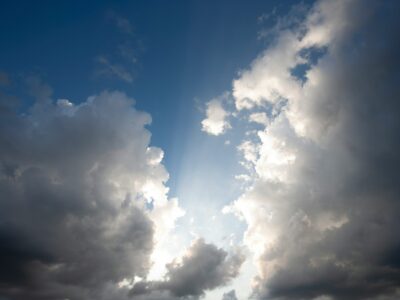April is National Poetry Month! I had grand visions of participating in #NaPoWriMo (National Poetry Writing Month) this year as I have done in the past, but it’s almost the end of the month, and, would you look at that, not a single poem written.
To make amends, I’m celebrating some of my favorite poets of faith who also engage with the natural world.
I saw a quote floating around Twitter one day that said, “I should just drop the P from ‘poetry,’ because all of my poems essentially say, ‘O, a tree.’”
This is my jam. If it isn’t trees, it’s birds, and if it isn’t birds, it’s flowers. My two poetry collections are titled, Pruning Burning Bushes and Between the Heron and the Moss. So, there you go.
Here are six poets who are just as obsessed with the natural world as I am. Have you read any of these poets? Who are your favorites?
Wendell Berry
Perhaps one of the most celebrated modern environmental writers, Wendell Berry is known for his works in fiction, poetry, and essays. He has published over 50 books in his lifetime. In much of his published work, Berry has aimed to speak out against the rise of agribusiness for its desolation of both the earth and of local communities. He practices what he preaches on the farm where he has lived for the last 40 years, in Port Royal, Kentucky, not far from his birthplace.
Berry’s poems are known for their celebration of the everyday miracles and holiness in ordinary life, glimmers of the divine we often overlook.
Here’s his poem, “Prayer After Eating.”
Jeff Gundy
Jeff Gundy has published eight collections of poems, most recently Without a Plea. His latest book, Wind Farm, is a collection of essays that explores both his childhood growing up on a Mennonite farm on the Illinois prairie and prairie life itself.
His poetry explores the spiritual while capturing our gritty, earthy relationships, in community, family, religion, and in nature.
Here is his lovely poem, “Plain Advice,” which is the first poem in Without a Plea.
Li-Young Lee
The son of Chinese political exiles, Li-Young Lee was born in Djakarta, Indonesia in 1957 and moved with his parents to the United States in 1964. Lee is a lyrical master who has said that every poem is a “descendant of God.” Lee is the kind of poet who can see God in everything. Lee is the author of five books of poems, most recently The Undressing.
Lee’s “From Blossoms” is a glorious celebration of the connectedness of our bodies and the (literal) fruits of the earth.
Mary Oliver
Maxine Kumin called Mary Oliver an “indefatigable guide to the natural world, particularly to its lesser-known aspects.” Oliver wrote many books of poems, including the selected poems, Devotions: The Selected Poems of Mary Oliver. Oliver’s work draws attention to the quiet, often overlooked places on the margins of our world—ponds, owls, hummingbirds, and so on—to capture their luminescence and wonder. These poems consistently engage with the intersections of the human and natural worlds. She’s probably most known popularly for the lines that conclude her poem, “The Summer Day”:
Tell me, what is it you plan to do
with your one wild and precious life?
Since we’ve just wrapped up our Easter celebrations, here’s Oliver’s poem, “Spring.”
Tania Runyan
Tania Runyan is the author of five collections of poems, most recently What Will Soon Take Place, as well as four field guides on writing college application essays and writing and reading poetry. Many of her poems intensely engage with Scripture, reimagining moments in the life of Jesus and many other biblical stories within our modern, messy context. What Will Soon Take Place is a direct grappling with the book of Revelation. A fellow bird watcher and gardener, Runyan’s poetry weaves the wreckage of the human heart with the pierced beauty of the natural world, all while grasping for more glimpses of God. Whether writing in form or free verse, Runyan’s poems are music.
Here are two poems by Runyan, “Groanings Too Deep for Words” and “Paul’s Blinding of Elymas.”
Luci Shaw
In the introduction to Luci Shaw’s most recent work, Angels Everywhere, she writes, “The word ‘angel’ means ‘messenger’ and the title poem of this book, ‘Angels Everywhere,’ presents the idea that what I often glimpse is a flicker of glancing light, as if a heavenly being is darting in and out of my viewing, allowing me entry into a realm beyond my physical, experiential world—brief revelatory messages from somewhere beyond.” Shaw is the author of 14 books of poems and several nonfiction books. Like the others listed above, Shaw is intensely interested in the Light’s manifestation in the world, its weight, its power, its ability to cast shadows and cast away the darkness.
Here is a little poem of hers, “Leaving.”





 Copyright
2024
Root and Vine
Copyright
2024
Root and Vine